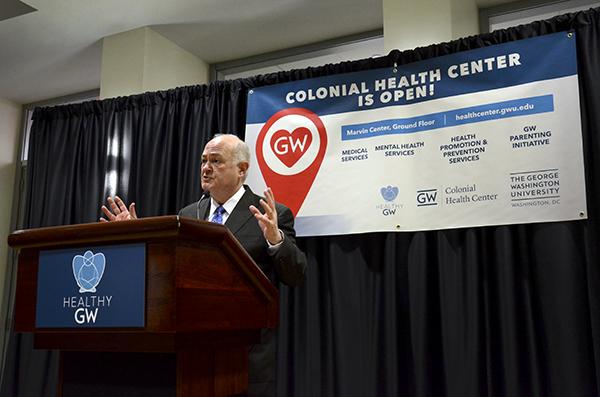The University is searching for a new administrator to oversee counseling for minority students.
The creation of the new position comes less than a month after turnover in Mental Health Services and GW’s diversity office, when the leaders of both areas left GW. Still, experts say the position could help bridge the gap for minority students who may struggle to feel understood in traditional counseling centers, and who need the extra support in order to succeed in college.
Silvio Weisner, the director of MHS, stepped down suddenly last month after officials found he was not licensed to practice psychology in D.C. Vice Provost for Diversity and Inclusion Terri Harris Reed resigned the same week to take a post at a historically black college. In their time at GW, both officials were tasked with creating more inclusive environments – taking steps like hiring specialists in niche areas for counseling and conducting campus climate surveys.
There is not currently a clinician dedicated to counseling students of color or other ethnic or cultural minorities. MHS also eliminated a counseling group called “students of color” this year.
The posting for the new position, called the assistant director of diversity and inclusion, was added to GW’s job’s website on Sept. 24. The administrator will ensure the center’s events are culturally sensitive, reach out to “marginalized” student populations, train other staff members on diversity issues and collaborate with campus partners for University-wide efforts, according to the job posting.
Senior Associate Dean of Students Mark Levine declined to provide specific reasons why the position was created.
“Diversity has been and will continue to be a priority for Mental Health Services,” Levine said.
Levine said the kinds of counseling groups offered fluctuate depending on the needs of students and what counselors can offer. Other groups currently include anxiety reduction, body image and a graduate student group.
“Group counseling topics are determined and modified based on staff resources and expertise as well as student demand and need,” Levine said in an email.
He added that there are currently counseling groups for LGBT and international students, and the center holds specific walk-in hours for LGBT students, international students and students of color.
Gillian Berry, the interim director of MHS, is black. She previously served as an associate director of MHS after arriving at GW.
The center is also hiring a veteran services coordinator and trauma services coordinator, according to GW’s job website.
Levine declined to comment on how long those positions have been vacant or when they are expected to be filled.
Louise Douce, who was the director of the Ohio State University’s counseling service for 23 years, said depending on students’ backgrounds and cultures, they may be less likely to seek out counseling, and it can be helpful for counseling services to reach out to and be representative of those populations.
“Recognizing that you’ve got problems and you need help, that can be difficult based on your culture,” Douce said. “That’s why counseling centers hire people with demonstrated expertise in diverse issues. When good staff have multicultural competency and you do good outreach, then minority students can often use it more.”
Nkechi Okoronkwo, a Nigerian-American sophomore who has gone through counseling both at and outside of the University, said when she talked to a white counselor at MHS, there were some things the counselor couldn’t understand.
“There were certain things that I was trying to describe to her culturally that she couldn’t connect to, and it blocked her from being able to truly empathize with my situation, and thusly provide me with help,” Okoronkwo said.
Okoronkwo, the secretary of the Ubuntu Service Group, which connects minority students at GW to community service opportunities in D.C., added that there is sometimes a stigma for immigrant students who seek counseling.
“That kind of creates an atmosphere where students who have parents who are immigrants are typically under a lot of stress. But there’s such a stigma attached to it that they don’t go to seek mental health services as well,” she said.
MHS has also added eight specialized counselors over the past year, who focus on populations from LGBT students to law students, and the center is focusing on hiring more clinicians this year.
George Brown, the executive director of recreation at the University of Alabama, said a position that bridges across departments could bring more students into counseling in a natural way.
“You’re on a nice track to say, ‘Hey, if we’re going to create an office for inclusion and diversity, it needs to thoughtfully and intentionally really reach out to the barriers students perceive in terms of mental health and access to mental health,’” Brown said.
Sera Royal contributed reporting.







